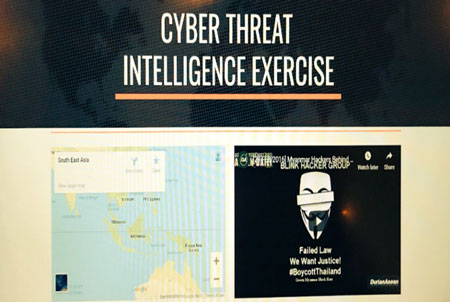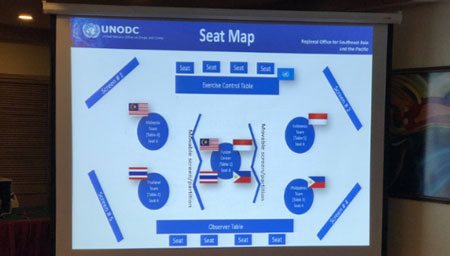
Langkawi (Malaysia), 26 February 2019 - United Nations Office on Drugs and Crime, Regional Office for Southeast Asia and Pacific, has organized today the first of its kind, regional exercise focusing on cyber threat intelligence and coordinated regional/sub-regional response to cybercrime and terrorism through cyberspace. This initiative is part of UNODC's broader support to UN Member States in Southeast Asia to strengthen the capability and response to identify, investigate, and pursue cyber-criminals to counter terrorist use of information and communications technology.
UNODC will be carrying out two such regional exercises under the framework of Cyber CT Project - "Enhancing capacities to respond to cybercrime and to counter terrorist use of information and communications technology throughout selected ASEAN Member states" funded by the Government of Japan.
UNODC had previously laid the groundwork and foundational knowledge by executing national trainings for Indonesia, Malaysia, Philippines, and Thailand (participating countries) targeting experts from law enforcement agencies, judiciary and intelligence agencies to ensure a scalable response for countering cybercrime, terrorism and other activities that undermine peace, prosperity and human development through cyberspace in the region.
Representatives from executive branches of the government, law enforcement and judiciary from the participating countries have attended this regional exercise to build partnerships, foster cooperation in a simulated cyber intelligence fusion center, to practice information sharing, coordinate processes, build custom technology toolkits, to build capacity in investigating organized criminals and terrorists in the virtual world using Open Source Intelligence (OSINT, online undercover techniques order ensuring better integration of potential cybercrime-CT online patrol task force.

The workshop was opened by Mr. Alexandru Caciuloiu, Regional Cybercrime and Cryptocurrency Advisor. Mr. Caciuloiu also highlighted the importance of multidimensional, comprehensive and multilateral strategic approach which should be put in place and urged the governments to act with diplomacy in this critical space by building resilience and cohesion between nations. Tackling the threats from non-state actors required concerted actions.
Regional workshops like this will enhance the knowledge of the investigators regarding advanced cyber threats, their motivations and strengthen the capabilities to detect, and respond through technical investigation using state of the art cyber intelligence tools, tactics, and techniques. Participants worked in a team-based environment across peers within nations to foster communication, teambuilding and collaboration for a resilient cyberspace.
Click here for information on the UNODC regional cybercrime programme